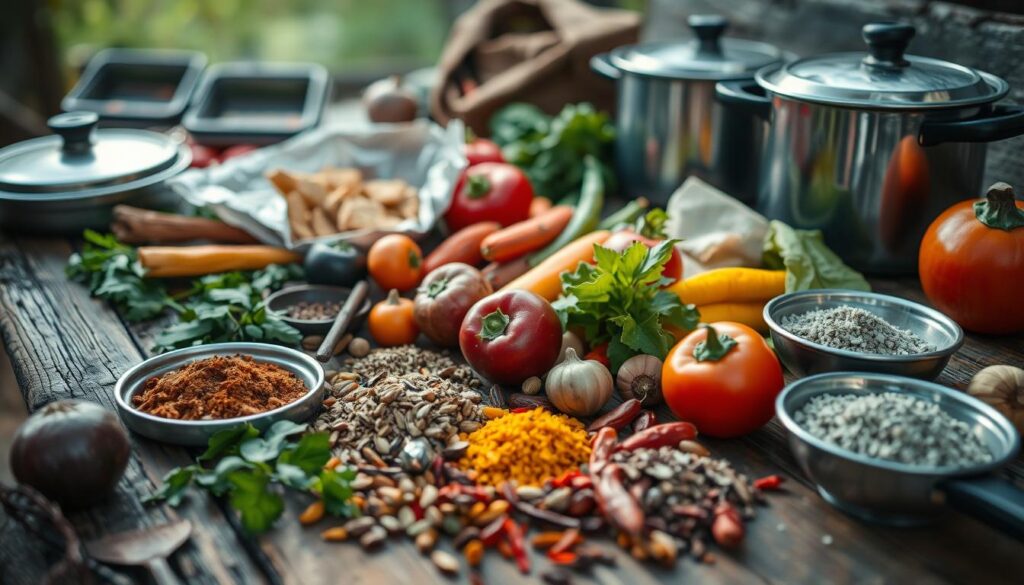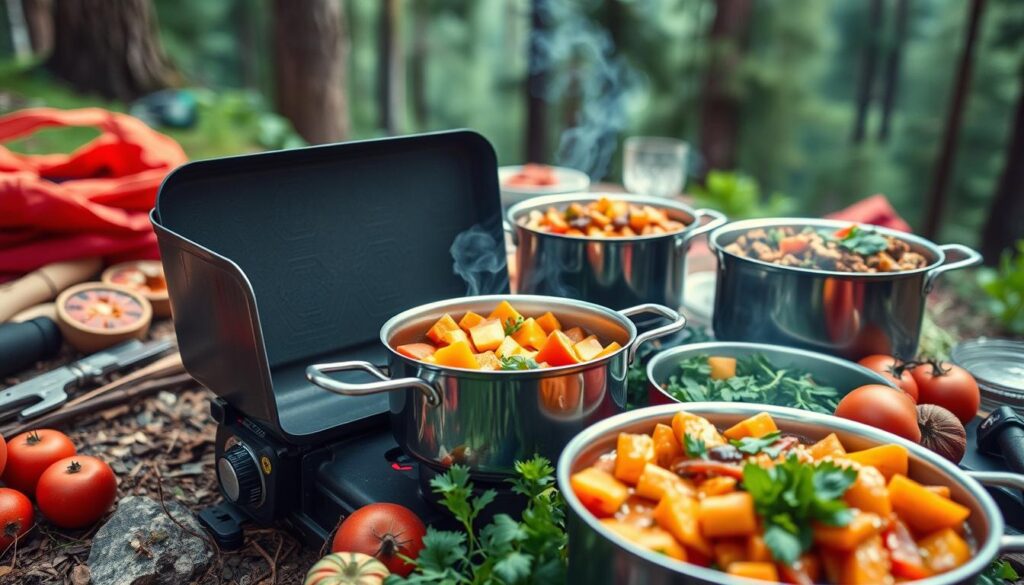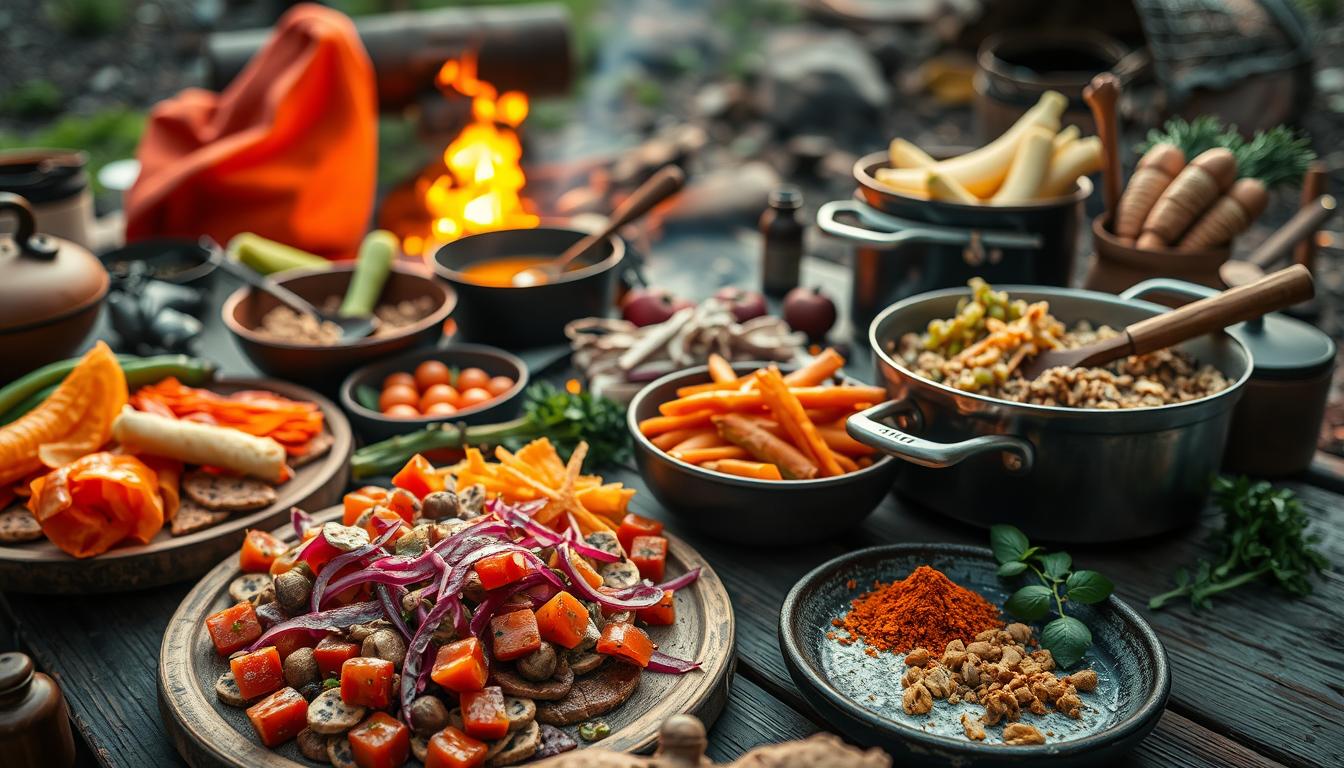The wilderness is calling, and your stomach is growling. Every serious adventurer knows that great meals can make a tough trek unforgettable. You’re about to discover over 25 easy backpacking recipes that will change your outdoor dining game.
Imagine enjoying a meal under starlit skies that’s both healthy and tasty. Our collection of backpacking recipes is more than just food. It’s about making memories that are as beautiful as the landscapes around you.
From protein-rich wraps to instant rice meals that hydrate fast, these meals are for those who love adventure and good food. Whether you’re out for the weekend or on a long trek, these meals will fuel your body and make you happy.
Your outdoor meals are about to get a lot better. Get ready to make your trail adventures even more special, one delicious meal at a time.
Jump to
Introduction to Backpacking Recipes
Going on a backpacking trip is more than just having the right gear. What you eat is key to keeping your energy up and enjoying the journey. Making meals that are light, healthy, and tasty can make your trip better.

Good outdoor cooking starts with knowing what your body needs. When you’re hiking, your body burns a lot of energy. So, planning your meals wisely is important.
Importance of Good Nutrition on the Trail
Eating right while backpacking is not just about feeling full. It’s about performing at your best. Your meals should have the right mix of nutrients to keep you going.
- Proteins for muscle recovery
- Complex carbohydrates for sustained energy
- Healthy fats for long-lasting fuel
Planning Your Meals for Optimal Energy
Good meal planning means making smart choices. No-cook camping meals can save you time and lighten your load.
| Meal Type | Calories | Protein |
|---|---|---|
| Lentil Lunch | 600 | 29g |
| Yogurt Bowl | 570 | 21g |
| Hearty Harvest | 570 | 30g |
Your backpacking menu should be light, full of nutrients, and match your energy needs. Think about the meal’s weight, how long it takes to prepare, and your dietary preferences when choosing recipes.
Tips for Preparing Backpacking Meals
Making the right lightweight camping meals is all about planning and picking the right ingredients. Your outdoor cooking ideas can make or break your trip. So, it’s key to know how to cook meals efficiently.

It’s not just about taste when preparing backpacking recipes. It’s also about getting the most nutrition with the least weight. Good meal planning can turn a tough hike into a fun one.
Choosing Lightweight Ingredients
When picking ingredients for your backpacking meals, keep these tips in mind:
- Go for dehydrated and freeze-dried foods to cut down on weight
- Choose calorie-rich foods like nuts and dried meats
- Include protein-rich foods for lasting energy
Cooking Methods for the Outdoors
Your outdoor cooking ideas should be simple and quick. Use portable stoves and no-cook meals to lighten your load.
| Cooking Method | Weight | Complexity |
|---|---|---|
| Portable Canister Stove | 8-12 oz | Low |
| Alcohol Stove | 3-4 oz | Medium |
| No-Cook Meals | 0 oz | High |
Packing and Storage Essentials
Good food storage keeps your meals safe and prevents animal encounters. Here are some packing tips:
- Use resealable bags to organize your meals
- Pack meals for each day to make them easy to find
- Use lightweight bear canisters or hang your food
- Keep your meals in a special stuff sack
The aim is to make meals that fuel your adventure without weighing you down. Try out different ingredients and cooking methods to find your favorite backpacking recipes.
Breakfast Ideas to Kickstart Your Day
Starting your day right is key when backpacking. You need food that gives you energy for tough trails and stunning views. Look for meals that are light, nutritious, and simple to make outdoors.
Breakfast recipes for backpacking aim for quick, high-energy meals. They should have carbs, proteins, and fats to keep you going all morning. This mix helps you stay energized.
Overnight Oats for Quick Energy
Overnight oats are great for backpacking. They’re full of nutrients and don’t need cooking. Here are some tasty options:
- Nut Butter Morning Oats with 22g protein per serving
- Lemon Blueberry Oatmeal with 663 kcal
- Banana Chocolate Groatmeal
Savory Egg Scrambles
For a protein-rich start, try egg-based breakfasts. Powdered egg mixes like OvaEasy are easy to use and don’t need fresh eggs.
| Breakfast Recipe | Protein | Preparation Time |
|---|---|---|
| Power Scramble Breakfast | 18g | 10 minutes |
| Amazing Blueberry Quinoa | 15g | 15 minutes |
Nutritious Smoothie Packs
Smoothie packs are a smart choice for backpackers. They’re light, full of energy, and easy to make. With pre-portioned, freeze-dried ingredients, you get a tasty, healthy breakfast.
Hearty Lunch Recipes to Keep You Full
When you’re out on the trail, picking the right no-cook camping meals is key. They help keep you energized and make your backpacking trip enjoyable. Trail-friendly recipes can turn your midday meal into a special treat.
Choosing the right lunch for the trail is important. You want to get lots of nutrition without carrying too much weight. Recipes that are light, nutritious, and easy to make can really enhance your outdoor adventure.
Wraps with Protein-Packed Fillings
Making tasty wraps is a skill for backpackers. Here are some protein-rich ideas:
- Tuna sachets packed in oil
- Lightweight jerky varieties
- Nut butter packets
- Pre-cooked chicken in lightweight packaging
A quick and easy option is the Sub in a Tub recipe. It’s a fresh twist on traditional trail lunches. You can layer ingredients without bulky bread.
Trail Mix Variations
Trail mix is more than a snack—it’s a nutritional boost for backpackers. Mix up your own blends with protein, healthy fats, and carbs for quick energy:
- Savory mix: Roasted nuts, dried meats, seeds
- Sweet blend: Dried fruits, dark chocolate chips, coconut flakes
- Protein-packed option: Almonds, pumpkin seeds, beef jerky
Instant Couscous Salads
Instant couscous is a light, quick-cooking option for trail meals. With just a little water, you can make a meal that’s full of nutrients and energy for your adventures.
Pro tip: Mix your couscous with dried veggies and protein powder before you go. This way, you get a complete meal that’s almost weightless in your backpack.
Delicious Dinner Options for Campfire Cooking
Dinner in the wilderness is more than food—it’s energy and comfort. Outdoor cooking ideas can make your backpacking trip unforgettable. They turn simple ingredients into tasty campfire meals.
Easy backpacking meals need smart planning and creativity. It’s important to balance taste, nutrition, and practicality. And don’t forget to keep your pack light.
One-Pot Pasta Delights
One-skillet meals are perfect for hungry hikers. They’re easy to clean up and full of flavor. Here are some tips:
- Pack lightweight pasta varieties
- Bring dehydrated vegetable mixes
- Carry lightweight olive oil packets
- Include powdered cheese for instant sauce
Quinoa and Vegetable Stir-Fry
Quinoa is great for a healthy dinner. It cooks fast and is packed with nutrients. Mix it with dried veggies for a meal that’s light in your pack.
Dehydrated Meals: Pros and Cons
Dehydrated meals can improve your outdoor cooking. Here are their benefits and downsides:
| Pros | Cons |
|---|---|
| Lightweight | Can be expensive |
| Long shelf life | Potential flavor compromise |
| Easy preparation | Limited fresh ingredient options |
| Compact storage | Requires hot water |
Try different dehydrated recipes to find your favorite. Remember, the best meal is the one that fuels your adventure and brings a smile to your face.
Snacks to Fuel Your Adventure
Choosing the right snacks is key for a great backpacking trip. They should give you energy, taste good, and be easy to carry. Knowing how to pick and make lightweight meals is essential for staying energized.
Energy Bars: Homemade vs. Store-Bought
Energy bars are a great snack for the trail because they’re easy and nutritious. Brands like Bobo, RX Bars, and GoMacro are good choices. Making your own energy bites lets you control what goes into them, perfect for vegan meals.
- Homemade options: No-bake energy balls with nuts and dried fruits
- Store-bought: Pre-packaged bars with balanced nutritional profiles
- Calorie density: Aim for 160 calories per ounce for efficient fuel
Jerky Choices for Protein Boosts
Protein is important for muscle recovery outdoors. Epic Provisions and Wild Zora have great meat jerky. For vegans, there are plant-based jerky options that keep you energized.
| Protein Source | Calories per Ounce | Type |
|---|---|---|
| Beef Jerky | 80-90 | Animal Protein |
| Vegan Jerky | 70-85 | Plant-Based |
Fresh Fruits and Nut Combinations
Backpacking recipes often include natural snacks that provide quick energy and essential nutrients. Trader Joe’s nut mixes, such as Thai Lime & Chili Cashews, add a flavorful twist to trail snacks. Combining dried fruits, nuts, and seeds creates lightweight, nutrient-packed camping meals that keep you fueled on the go.
- Banana chips: A high-calorie dried fruit option
- Yogurt-covered raisins: A sweet energy boost
- Mixed nuts: A great source of healthy fats and protein
Smart snack choices can transform your backpacking experience. Plan wisely, pack efficiently, and enjoy every moment of your outdoor adventure.
Hydration and Beverage Ideas
Staying hydrated is key when you’re outdoors. Drinking enough water keeps your energy up and helps your body perform well. It’s important to think about what drinks you’ll have when planning your meals for backpacking.
Choosing the right drinks is a big part of your meal plan. What you drink can greatly affect your comfort and nutrition on the trail.
Herbal Teas for Nighttime Warmth
Herbal teas are great for keeping warm and hydrated at night. Light options like chamomile and peppermint are easy to pack and make. Here are some tea ideas for backpacking:
- Instant herbal tea packets
- Dried loose leaf tea in small containers
- Compact tea bags designed for backpacking
Electrolyte Drinks for Recovery
It’s important to replace lost electrolytes after a long day of hiking. Portable electrolyte powders help keep your body balanced and prevent tiredness. These drinks are often used in backpacking recipes to keep you performing well.
Cooling Smoothies for Refreshment
Dried fruits can make tasty trail smoothies. Mix your favorite fruits with water for a cool drink that gives you quick energy. These ideas are great for staying cool on hot days.
Don’t forget to bring ways to purify water for safe drinking. Your plan for staying hydrated is just as important as your meal planning for a great backpacking trip.
Dessert to Satisfy Your Sweet Tooth
Every backpacking adventure needs a sweet finish. Trail-friendly recipes can make your outdoor meals tasty and easy. Desserts not only lift your mood but also give you energy for your journey.
When picking easy backpacking meals, think about desserts that are light, healthy, and simple to make. Your recipes should be tasty, nutritious, and easy to carry.
Camping-Friendly S’mores with a Twist
Classic s’mores get a new twist for backpackers. A lightweight pie iron makes campfire desserts easy. Try these fun variations:
- Traditional graham cracker s’mores
- Roasted fruit dipped in marshmallow Fluff
- Toasted pound cake slices with char
No-Bake Energy Bites for Quick Nutrition
Energy bites are great backpacking recipes for quick energy. These small treats are full of nutrients:
| Ingredient | Nutritional Benefits |
|---|---|
| Oats | Complex carbohydrates |
| Nut butter | Healthy fats |
| Dried fruits | Natural sugars |
Trail-Friendly Cookies for Sweet Satisfaction
Make cookies before your trip for a quick mood booster. Good options include:
- Oatmeal raisin cookies
- Peanut butter cookies
- No-bake protein cookies
The best backpacking desserts are light, full of nutrients, and simple to pack. Try these recipes to find your favorite trail treat!
Eco-Friendly and Budget-Friendly Tips
Going on a backpacking trip doesn’t have to cost a lot or harm the planet. By planning your vegan and lightweight meals wisely, you can save money and protect the environment.
Reducing Waste While Backpacking
To cut down on waste, pick the right recipes and packaging. Here are some tips:
- Use reusable containers instead of single-use plastics
- Select foods with minimal packaging
- Opt for biodegradable utensils and food wraps
- Pack out all trash and leave no trace
Money-Saving Meal Prep Ideas
Make affordable, lightweight meals with these tips:
- Dehydrate fruits and vegetables at home
- Buy ingredients in bulk
- Prepare no-cook meals in advance
- Create your own trail mix
| Ingredient | Cost per Serving | Calories |
|---|---|---|
| Knorr Pasta Sides | $1-$2 | 600 calories |
| Instant Miso Soup | $0.50 | 30-50 calories |
| Tuna Pouches | $1.50 | 110-130 calories |
Choosing Sustainable Ingredients
When picking ingredients for your vegan meals, focus on sustainability:
- Choose locally sourced organic products
- Select freeze-dried produce for better nutrient retention
- Purchase from the international food aisle for diverse, budget-friendly options
- Consider plant-based protein sources
With smart planning and choices, you can make tasty, healthy, and eco-friendly meals. These meals will be good for your wallet too.
Conclusion: Your Backpacking Culinary Adventure
Your journey with backpacking recipes is just starting. It’s a never-ending quest to find new outdoor cooking ideas. With time, you’ll master the art of making easy backpacking meals that are both healthy and tasty.
Encouragement to Experiment
Start your culinary journey on the trail. Brands like Backpacker’s Pantry show that backpacking meals can be varied and fun. Try combining different dehydrated meals, adding extra veggies, or using hot sauce packets to spice up your dishes.
Resources for Further Inspiration
Keep exploring new backpacking recipes online, in cookbooks, and on outdoor cooking sites. The key to great trail meals is balancing nutrition, weight, and flavor. From fancy quinoa salads to protein-rich jerky mixes, your creativity is the only limit.
FAQ
How do I choose the right meals for backpacking?
When picking backpacking meals, think about three things: weight, nutrition, and how easy they are to make. Choose foods that are light but full of calories. Look for dehydrated or freeze-dried meals that are high in energy but don’t weigh much.
Make sure your meals have proteins, carbs, and fats. This mix keeps you energized on your adventure.
What are some good no-cook meal options for backpacking?
No-cook meals save time and cut down on cooking gear. Try tortilla wraps with tuna or chicken, or cold-soak meals like pasta or couscous. Energy bars, nut butter packets, and trail mix are also great choices.
Pre-made salads, like the Outdoor Herbivore Waldorf Salad, are easy to pack. Greenbelly meal bars offer a full meal at 650 calories without cooking.
How can I keep my backpacking meals fresh and safe?
Keeping food safe is key. Use bear canisters in wildlife areas and pack meals in airtight containers. Choose foods that last long, like dehydrated and freeze-dried options.
Keep perishables to a minimum and use coolers. Always keep food sealed and away from moisture and extreme temperatures.
Are there good vegan options for backpacking meals?
Yes! Vegan backpacking meals are tasty and healthy. Try plant-based proteins like beans, nuts, and vegan jerky. Dehydrated vegetable meals and quinoa dishes are also good choices.
Energy bars from brands like GoMacro are great. You can also make your own meal packs with dried fruits, nuts, and plant-based proteins.
How can I reduce waste while backpacking?
To be eco-friendly, pick meals with little packaging. Use reusable containers and choose brands like RightOnTrek that use biodegradable packaging. Prepare meals at home with local ingredients and dehydrate your own fruits and veggies.
Plan meals that waste less. Bring lightweight, washable utensils and containers to reduce waste even more.
What’s the best way to stay hydrated on the trail?
Staying hydrated is essential. Carry a good water filter and bring electrolyte drinks like Tailwind Nutrition. Pack lightweight drinks like instant coffee, herbal teas, and powdered mixes.
Drink water often and watch your intake based on how active you are and the weather.
How do I plan meals for multi-day backpacking trips?
For long trips, choose foods that are light but full of energy. Plan meals ahead, thinking about how many calories you’ll need. Pack a variety of meals to avoid getting tired of the same thing.
Include snacks rich in nutrients. Use dehydrated meals, vacuum-sealed options, and portion control to manage weight and nutrition.

